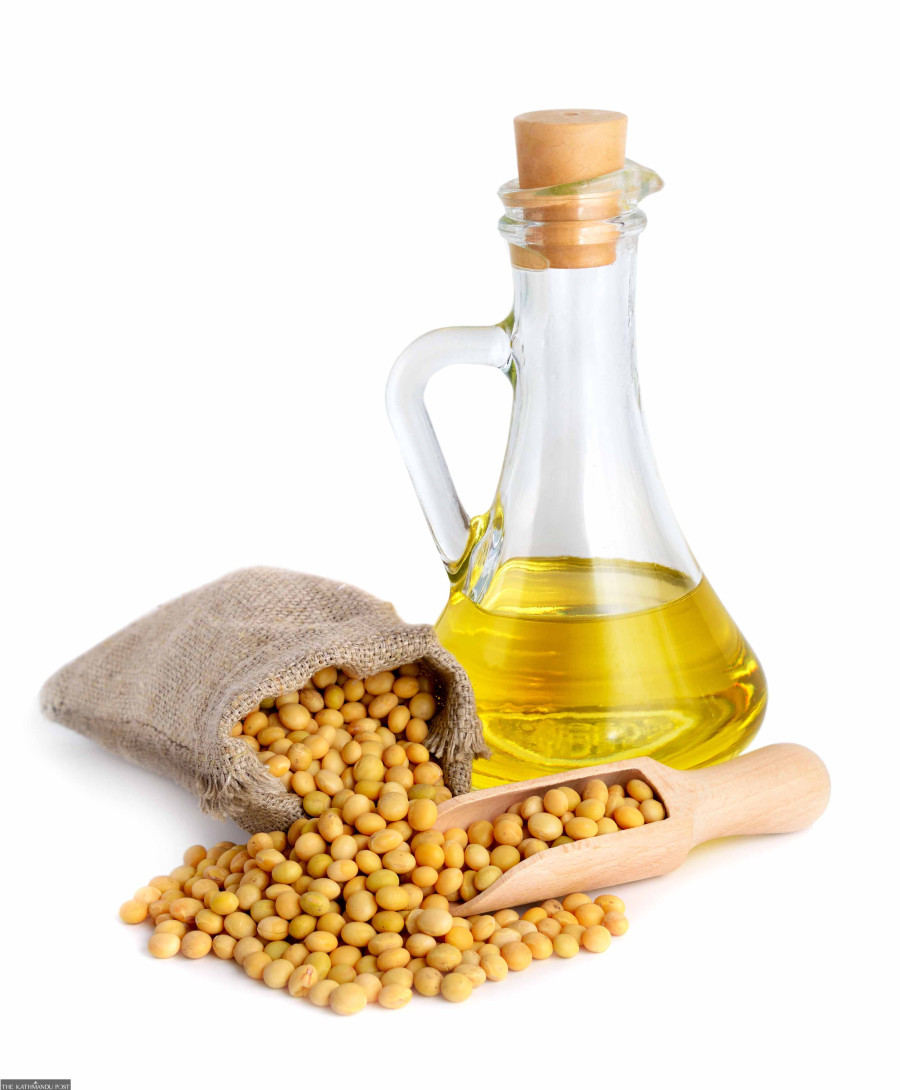Money
Nepal’s annual soybean oil exports to India near Rs50 billion
Despite the impressive export statistics, the soybean oil trade contributes very little to the national economy, say economists.
Krishana Prasain
Nepal's soybean oil exports to India hit a staggering Rs42.34 billion in the first 11 months of the fiscal year, a four-fold jump from Rs10.12 billion in the same period in the previous year, making it the country's number one export commodity.
Experts say shipments could reach Rs50 billion by the end of the fiscal year in mid-July, due to the rent seeking mentality of Nepali traders and the eagerness of the government to amass revenue, which has allowed exporters to exploit loopholes in the zero tariff privilege given to Nepal as a least developed country.
Despite the impressive export statistics, the soybean oil trade contributes very little to the economy and provides few jobs to the Nepali people, say economists.
Nepal produces very little soybean oil of its own, in fact, just 31,567 tonnes of raw soybean annually, which is not enough to meet the requirement of even a fraction of its own population. But it exports 246,376 tonnes of processed soybean oil in the same period. How does it do that?
Nepal imported crude soybean oil valued at Rs45.60 billion and re-exported processed oil worth Rs42.34 billion to India during the first 11 months of the current fiscal year (mid-July 2020 to mid-June 2021), according to the Department of Customs.
Tariff exemptions on Nepali exports to India under the South Asian Free Trade Area (SAFTA) agreement give domestic traders an advantage. Countries outside of South Asia are slapped with tariffs of 45 percent on soybean oil.
Trade experts said that importing crude oil with zero tariff privilege and exporting it to India with zero traffic privilege enables Nepali traders to enjoy a net profit of 45 percent, excluding other profits.
Trade economist Posh Raj Pandey said Nepali exporters need to fulfil the criteria of 30 percent value addition to enjoy the zero tariff privilege, but this is not reflected in the soybean trade.
“Nepal has been exporting large cardamom worth Rs5 billion annually and tea as well. The increase in the export of these farm products benefits the farmers of three to four districts, raising the economic status of thousands of farmers. What’s the contribution of soybean to the national economy and employment,” he asked.
“How can we call it an industry when it imports raw materials, refines and re-exports them. This does not need much labour and factory expenses are also small,” he said, adding that these kinds of trade privileges kill farm productivity.
“It does not encourage farmers. I don’t think the export of soybean oil worth Rs42 billion has generated even 1,000 jobs.”
Nepal imported 401,418 tonnes of soybean oil, mainly from Argentina, Brazil, Egypt, Paraguay and Ukraine, while it exported 246,376 tonnes of refined soybean oil to India.
The import allowed the government to collect revenue worth Rs4.26 billion from the soybean oil trade in the first 11 months of the current fiscal year.
The Indian government has been raising the issue of the ballooning soybean trade after it restricted imports of palm oil in January 2020.
In March, following a huge increase in exports of refined soybean oil from Nepal, the Indian government wrote to Nepal’s Ministry of Foreign Affairs to "confirm the genuineness and authenticity" of the product originating criteria or the certificate of origin issued by Nepali authorities for the export of edible oil to India under SAFTA.
Dinesh Bhattarai, secretary of the Ministry of Industry, Commerce and Supplies, said that the ministry had replied to all the issues raised by the Indian government, mostly regarding the authenticity of the certificate of origin of the product through the Foreign Ministry.
“They have asked whether the certificate of origin is authentic or not. As the process was correct, we answered that it was so,” he said.
Narayan Regmi, spokesperson for the Industry Ministry, said that exports had increased along with demand in the Indian market, and that it was legal trade.
With massive imports of soybean oil from Nepal hurting refiners in eastern and northern India and Indian farmers and also incurring loss of revenue to the government, the Solvent Extractors’ Association of India, one of the oldest organisations of vegetable oil and trade, has been asking the Indian government to fix quotas on imports, saying that soybean oil has become Nepal's top export commodity even though the country does not produce it commercially.
“India can anytime restrict import of refined soybean oil or can investigate how Nepal is making value addition,” Pandey said. “So, this type of product should not be promoted. It neither generates employment nor revenue to the government,” he told the Post.
Till around 1996, the rules of origin had not been defined in the trade with India, and the southern neighbour was providing duty free access to Nepali products in a bid to promote industrialisation in Nepal.
But the condition was later changed after Nepali traders began misusing the provision in vegetable ghee and copper wire trade. In the 2002 trade treaty, India added the value addition criteria, tariff rate quota and tax provision, said trade experts.
“This kind of action will prompt India to make trade conditions more stringent, which will impact long-term trade relationship,” said Pandey. “In Nepal’s context, $400 million worth of exports of a single product, which Nepal doesn’t even produce, is a huge amount.”
In 2000, an investigation into the massive amount of exports of vegetable ghee from Nepal to India revealed that only five to six families were involved in the trade, said Pandey.
Nepal's imports of crude sunflower oil totalled Rs14 billion, but exports amounted to only Rs2 billion as most of the processed product is consumed in the country.




 17.12°C Kathmandu
17.12°C Kathmandu














